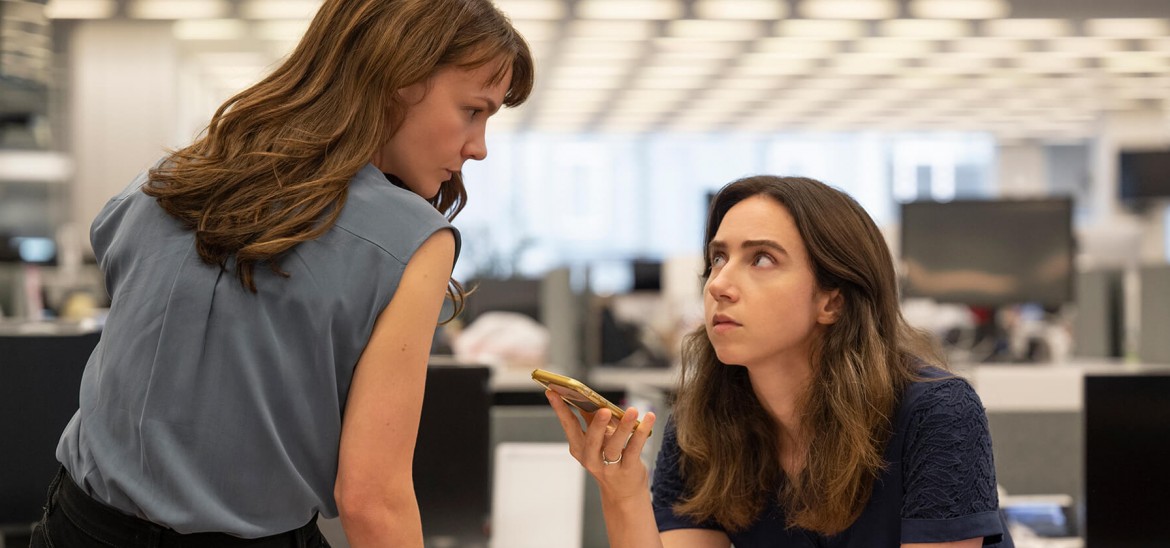Into Film Clubs
Find out everything you need to know about starting an Into Film Club.



In a behind-the-scenes retelling of one of modern media's most defining moments, She Said is a female-fronted story about journalism, the film industry and speaking out against sexual harassment. The film offers young audiences multiple layers of context to discuss consent, power, and empowerment.
In October 2017, The New York Times published a momentous article about historical sexual abuse allegations against Harvey Weinstein, one of the most powerful people in the film industry. The scandal snowballed as more and more people came forward to accuse the Hollywood producer. The revelations sparked a worldwide debate on the pervasiveness of sexual harassment and ignited the #MeToo movement. She Said is the story behind the story, of how two journalists slowly gathered a record of what had happened, exposing a whole system that covered up for Weinstein. The article was followed by a book about the investigation, now brought to the screen in this biographical drama. With the disclosures fresh in society's collective memory and a general move towards calling out toxic behaviour, what can audiences learn from revisiting the beginnings of these reluctant conversations?
Exploring how this story broke through a camera lens is a timely attempt at holding the film industry accountable. She Said provides an insight into the world of cinema, drawing on the memories of professionals and their first times on movie sets, at festivals, or doing castings. The film manages to acknowledge the excitement about exploring these career paths but highlights that there is nothing glamorous about a culture of harassment and bullying. The story focuses as much on "ordinary" women in the industry, such as runners and assistants, as it does on the film stars whose experiences dominated media coverage, including actor Ashley Judd who plays herself.
For a film made by a big Hollywood studio, drawing attention to its industry's problematic history is significant, but potentially also problematic, as it may open the filmmakers up to accusations of exploiting trauma for box-office sales. Herein lies an opportunity for Film Studies students and young cinephiles to discuss the tendency towards sensationalism in Hollywood, to debate the sensitivity with which such topics should be handled and to develop a critical understanding about a professional field that should be accessible and have a duty of care to all.
I hope that women come and see this film and feel themselves represented and feel that speaking up when something happens could be something that is supported and could make a change. We are not there yet, but as long as we keep going on this path, the change is possible.
Zoe Kazan “Jodi Kantor”, She Said - A Look Inside Featurette
Driving the narrative of the film is the unrelenting investigative work of New York Times reporters Jodi Kantor and Megan Twohey, played by Zoe Kazan and Carey Mulligan. As they try and get women to speak on the record about the intimidation that they suffered, the story becomes not just about the depraved actions of one man, but about the sheer scale of a system set up to protect abuses of power. To see women taking a determined lead on this reporting, supported by The New York Times' first Black executive editor played by Andre Braugher, is refreshing. This representation provides a modern perspective on a traditionally white male-dominated media landscape, as seen in Spotlight, based on a real investigation about abuse in the Catholic Church, and All the President's Men, based on the true story of the reporters who uncovered the Watergate scandal.
In the case of She Said, female voices are amplified both in front of and behind the camera, with director Maria Schrader and screenwriter Rebecca Lenkiewicz taking on the responsibility in tandem with the protagonists of telling other women's stories in a conscientious way. Against the statistic that women have barely filled 25% of key behind-the-scenes roles on the top grossing films in recent years, She Said is an example of a film that may be defined as F-Rated, meaning that it is directed and/or written by women. Young audiences may find this concept a useful reference for further conversations around diversity and authenticity.
A new trial against Harvey Weinstein is currently underway, five years after the story first broke, and the issues about misconduct that She Said raises still feel unnervingly relevant. Several films currently available to stream on Into Film+ also explore different interpretations of this topic. The Assistant follows a day in the life of an aspiring film producer working for a Weinstein-like media mogul. Promising Young Woman takes a dark, subversive approach to the theme of predatory behaviour, while Mustang is a coming-of-age drama about rebelling against men's authority over female bodies. F-Rated films such as these and She Said are reminders that speaking the truth matters, and that sharing stories can promote a sense of agency and a perspective on gender equality that young people can apply to all aspects of their lives.
She Said is released in cinemas on Friday 25 November.
Viewing 4 of 4 related items.

Find out more about our streaming service, designed specifically for UK schools.